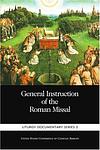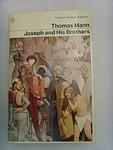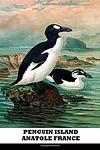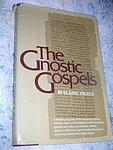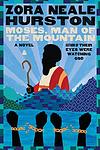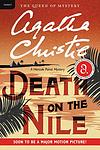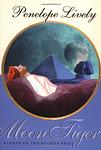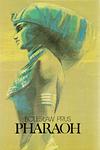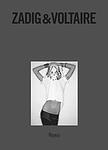The Greatest "Egypt" Books of All Time
Click to learn how this list is calculated.
This list represents a comprehensive and trusted collection of the greatest books. Developed through a specialized algorithm, it brings together 284 'best of' book lists to form a definitive guide to the world's most acclaimed books. For those interested in how these books are chosen, additional details can be found on the rankings page.
Genres
Countries
Date Range
Reading Statistics
Click the button below to see how many of these books you've read!
Download
If you're interested in downloading this list as a CSV file for use in a spreadsheet application, you can easily do so by clicking the button below. Please note that to ensure a manageable file size and faster download, the CSV will include details for only the first 500 books.
Download-
1. The Bible by Unknown
The Bible is the central religious text of Christianity, comprising the Old and New Testaments. It features a diverse collection of writings including historical narratives, poetry, prophecies, and teachings. These texts chronicle the relationship between God and humanity, detail the life, death, and resurrection of Jesus Christ, and follow the early Christian church. Considered divinely inspired by believers, it serves as a foundational guide for faith and practice, influencing countless aspects of culture and society worldwide.
-
2. The Alchemist by Paulo Coelho
A young Andalusian shepherd named Santiago dreams of finding a worldly treasure and sets off on a journey across the Egyptian desert in search of it. Along the way, he encounters a series of characters who impart wisdom and help guide his spiritual journey. The novel explores themes of destiny, personal legend, and the interconnectedness of all things in the universe. The boy learns that true wealth comes not from material possessions, but from self-discovery and attaining one's "Personal Legend".
-
3. The Histories of Herodotus by Herodotus
"The Histories of Herodotus" is an ancient text that provides a comprehensive account of the Greco-Persian Wars. It is often considered the first work of history in Western literature. The author, often referred to as the 'Father of History', provides a narrative that not only discusses the conflicts between the Greeks and Persians, but also delves into the customs, geography, and history of each civilization. This detailed and pioneering work has greatly contributed to our understanding of the ancient world.
-
4. The Alexandria Quartet by Lawrence Durrell
"The Alexandria Quartet" is a tetralogy of novels that explore the intricate relationships between a group of friends and lovers in Alexandria, Egypt, before and during World War II. The novels are known for their rich and evocative descriptions of the city and its diverse inhabitants, as well as their innovative narrative structure, which presents the same events from different characters' perspectives in each book. The work explores themes of love, betrayal, and the nature of reality and perception.
-
5. Joseph and His Brothers by Thomas Mann
This novel is a re-imagining of the biblical story of Joseph, known for his coat of many colors. The narrative delves deeply into the psychological aspects of each character, exploring their motivations, flaws, and virtues. The story covers Joseph's life from his early years in Canaan, through his betrayal by his brothers who sell him into slavery in Egypt, his rise to power in Pharaoh's court, and his eventual reconciliation with his brothers. The novel is a rich tapestry of dreams, myths, and rituals, blending biblical tradition with the author's own philosophical insights.
-
6. The English Patient by Michael Ondaatje
"The English Patient" is a story of four diverse individuals brought together at an Italian villa during the final days of World War II. The narrative revolves around a severely burned man who can't remember his name or past, a young Canadian nurse who tends to him, a Sikh British Army sapper, and a Canadian thief. As they navigate their own traumas and losses, the past of the mysterious patient slowly unravels, revealing a tale of love, identity, and betrayal.
-
7. Woman at Point Zero by Nawal El Saadawi
"Woman at Point Zero" is a powerful novel about a woman named Firdaus who, after a life filled with hardships and abuse, finds herself on death row in an Egyptian prison. The narrative explores her life story, from her childhood of poverty and genital mutilation to her experiences with domestic violence, prostitution, and finally murder. Through her journey, the book offers a profound critique of patriarchal society and the systemic oppression of women.
-
8. Around the World in Eighty Days by Jules Verne
The novel follows the journey of a wealthy Englishman who makes a high-stakes wager that he can travel around the world in eighty days. Accompanied by his loyal French valet, they encounter numerous obstacles and adventures across different cultures and landscapes, including rescuing a beautiful Indian woman from a ritual sacrifice. The book is a celebration of the technological advancements of the 19th century, with the main characters utilizing various modes of transportation such as steamships, railways, and even an elephant.
-
9. Thaïs by Anatole France
"Thaïs" is a historical novel set in Egypt during the 4th century, revolving around a beautiful and hedonistic courtesan, and a Christian ascetic monk who becomes obsessed with her. The monk, seeking to save her soul, convinces her to abandon her life of luxury and pleasure to live in a convent as a penitent. However, as she finds peace and salvation in her new life, the monk is tormented by his repressed desires and lust for her, ultimately leading to his own spiritual downfall. The novel explores themes of desire, faith, and the destructive power of obsession.
-
10. Children of Gebelawi by Naguib Mahfouz
"Children of Gebelawi" is a novel that allegorically presents the stories of Moses, Jesus, and Mohammed through the lives of characters in a Cairo neighborhood. The patriarch, Gebelawi, has five children, each representing a different prophet or religious figure, and their struggles mirror the religious and philosophical conflicts of the 20th century. The book explores themes of power, faith, and redemption, and it sparked controversy upon publication due to its portrayal of sacred figures.
-
11. Palace Walk by Naguib Mahfouz
The novel is set in Cairo during World War I and revolves around the life of a conservative Muslim family. The patriarch, a shopkeeper, has two wives and several children, and the story explores the dynamics within the family, particularly the tyrannical father's relationships with his wives and children. As the family navigates through a changing society, they encounter various challenges including political unrest, societal norms, and the struggle between tradition and modernity.
-
12. Poems Of C. P. Cavafy by C. P. Cavafy
The book is a collection of lyrical poetry that delves into themes of historical reflection, personal experience, and existential contemplation. The poet, known for his profound and often melancholic musings, explores the depths of human emotion and the passage of time, frequently drawing upon Hellenistic history and mythology to enrich his verse. His work is characterized by a sense of nostalgia and a deep appreciation for the fleeting moments of beauty and pleasure in life, as well as an acute awareness of the inevitable decay and loss that accompany them. The poems are celebrated for their technical mastery, rich language, and the ability to evoke vivid imagery and complex emotional landscapes.
-
13. Justine by Lawrence Durrell
"Justine" is a novel set in pre-World War II Alexandria, Egypt, and is the first in a quartet of books. The story is told from the perspective of an Irish teacher living in Alexandria, who becomes entangled in a complex love triangle with a beautiful Jewish woman named Justine and her husband, a wealthy Coptic Christian. The narrative explores themes of love, betrayal, and cultural tension against the backdrop of a city teeming with political intrigue and social unrest.
-
14. The Gnostic Gospels by Elaine Pagels
This book explores the findings of the Nag Hammadi library, a collection of gnostic texts discovered in 1945. The author examines these texts, which were excluded from the canonical Bible, and discusses their implications for our understanding of early Christianity. The book delves into the diversity of beliefs in early Christian communities, the role of women in these groups, and the political and theological reasons behind the formation of the orthodox Christian canon.
-
15. The Mediterranean And The Mediterranean World In The Age Of Philip Ii by Fernand Braudel
This seminal work offers a comprehensive analysis of the Mediterranean region during the 16th century, focusing on the complex social, political, and economic landscapes that defined the era of Philip II of Spain. The book transcends traditional historiography by emphasizing the geographical and ecological factors that shaped human activity, from the ebb and flow of commerce and the patterns of agrarian life to the rise and fall of empires. Through a meticulous study of the Mediterranean world, the narrative weaves together the intricate tapestry of cultures, religions, and power dynamics that characterized the period, providing a vivid portrayal of the enduring influence of the environment on the course of human history.
-
16. Miramar by Naguib Mahfouz
Set in 1960s Egypt, "Miramar" tells the story of an aging revolutionary, a rich man's daughter, a corrupt journalist, and a real estate agent who all come to reside at the Miramar Pension in Alexandria. Their lives intertwine with the life of the young peasant woman who works there as a maid, and through their interactions, the novel explores themes of social and political change in Egypt, the struggle between old and new, and the power of the individual to shape their own destiny.
-
17. Midaq Alley by Najib Mahfuz
Set in an old Cairo neighborhood during World War II, the novel delves into the lives of the residents of a bustling alley, offering a tapestry of human experiences and social issues. Through the stories of a diverse cast of characters, including a young beauty dreaming of a better life, a wealthy businessman seeking love, a cafe owner yearning for his past, and others, the narrative explores themes of love, ambition, and the struggle for personal fulfillment. The alley serves as a microcosm of society, reflecting the larger cultural and political changes occurring in Egypt at the time, and the characters' intertwined lives illustrate the complexities of human nature and the universal quest for happiness and meaning.
-
18. The Arabian Nightmare by Robert Irwin
"The Arabian Nightmare" is a captivating and surreal journey through the dreams and nightmares of a young scholar named Abdulla. Set in medieval Cairo, the book explores the blurred lines between reality and fantasy as Abdulla becomes entangled in a web of magical creatures, mythical beings, and supernatural occurrences. With richly descriptive prose and a deep understanding of Arabian folklore, the story delves into themes of identity, love, and the power of storytelling, leaving readers questioning the nature of dreams and the boundaries of the human imagination.
-
19. The Cairo Trilogy by Naguib Mahfouz
"The Cairo Trilogy" is a captivating tale set in Egypt during the early 20th century, following the lives of the Abd al-Jawad family. The trilogy explores the intricacies of family dynamics, societal changes, and political unrest, as it delves into the personal struggles and triumphs of its characters. With vivid descriptions and rich storytelling, the trilogy offers a deep insight into the complexities of Egyptian society, tradition, and modernization, making it a timeless masterpiece of literature.
-
20. Moses, Man Of The Mountain by Zora Neale Hurston
In this novel, the iconic biblical tale of Moses is reimagined through a unique blend of folklore, cultural anthropology, and African American spirituality. The story follows Moses, a powerful and complex figure, as he leads his people out of Egypt and slavery, challenging both the Pharaoh's tyranny and the skepticism of his followers. The narrative weaves together themes of leadership, faith, and liberation, while exploring the intersections of race, religion, and power. The author infuses the ancient story with rich vernacular and a deep understanding of the African American experience, offering a fresh perspective on a timeless epic.
-
21. Death On The Nile by Agatha Christie
"Death On The Nile" is a thrilling murder mystery set aboard a luxurious Nile river cruise. When a young and beautiful heiress is found dead, renowned detective Hercule Poirot must navigate a web of deceit, jealousy, and hidden motives to uncover the truth behind her untimely demise. As the suspects become increasingly desperate to protect their secrets, Poirot races against time to solve the puzzle before the killer strikes again.
-
22. Moon Tiger by Penelope Lively
"Moon Tiger" is a profound exploration of memory and history, narrated by a dying historian, Claudia Hampton, who decides to write a history of the world, but it turns out to be her own history as well. The narrative moves back and forth in time, reflecting Claudia's fragmented memories, and delves into her past relationships, particularly a passionate love affair in Egypt during World War II. The novel explores themes of love, war, the fluidity of time, and the subjective nature of history.
-
23. Pharaoh by Bolesław Prus
"Pharaoh" is a historical novel set in ancient Egypt, during the reign of Pharaoh Ramses XIII. The story is a complex and compelling tale of court intrigue, power struggles, and the inevitable clash between church and state. The young Pharaoh, Ramses XIII, is pitted against the powerful and entrenched priesthood and the corrupt and decaying Egyptian nobility. The novel explores themes of power, corruption, and the human condition, while providing a detailed and accurate portrayal of ancient Egyptian culture and society.
-
24. Zadig by Voltaire
The book is an Enlightenment-era philosophical novel that follows the adventures of its eponymous hero, a young nobleman in ancient Babylonia. Through a series of misfortunes and experiences, including love, injustice, and chance, the protagonist explores themes of fate, free will, and the search for truth. His journey is marked by encounters with a diverse cast of characters, each representing different aspects of society and human nature. The protagonist's wisdom and observations on human folly and the ironies of life offer a satirical critique of the social and political systems of the day, ultimately advocating for enlightenment and reason over superstition and tyranny.
-
25. The Balkan Trilogy by Olivia Manning
The narrative follows a young British couple, Harriet and Guy Pringle, as they navigate the tumultuous landscape of Eastern Europe during the early years of World War II. Set against the backdrop of the Balkans, the trilogy paints a vivid picture of the couple's experiences in Romania and Greece, where they encounter a diverse cast of characters, from diplomats and soldiers to refugees and spies. As the war encroaches on their lives, their marriage is tested by the strains of displacement, political uncertainty, and personal betrayal, offering a poignant exploration of love, loyalty, and the human spirit amidst the chaos of conflict.
Reading Statistics
Click the button below to see how many of these books you've read!
Download
If you're interested in downloading this list as a CSV file for use in a spreadsheet application, you can easily do so by clicking the button below. Please note that to ensure a manageable file size and faster download, the CSV will include details for only the first 500 books.
Download